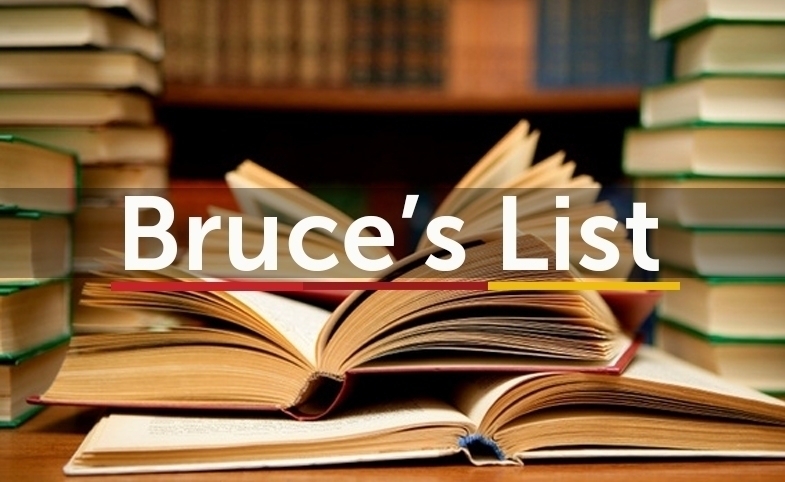The November edition of CPD Faculty Fellow Bruce Gregory's public diplomacy reading list is now available. Known affectionately at CPD as "Bruce's List," this list is a compilation of books, journal articles,...
KEEP READING
Latest Must-Reads in Public Diplomacy: May 2018
The May edition of CPD Faculty Fellow Bruce Gregory's public diplomacy reading list is now available. Known affectionately at CPD as "Bruce's List," this list is a compilation of books, journal articles, papers and blogs on a wide variety of PD topics and features a number of CPD scholars.
Highlights from this latest list include:
Ries Kamphof and Jan Melissen, “SDGs, Foreign Ministries and the Art of Partnering with the Private Sector,” Global Policy, 2018. Kamphof and Melissen (Netherlands Institute of International Relations, 'Clingendael') examine conceptual and diplomatic practice issues in partnerships between foreign ministries and private stakeholders intended to achieve Sustainable Development Goals (SDGs). Their article builds on the idea that networking is now the dominant conceptual basis for diplomacy, with consequences for how we think about diplomats in multi-stakeholder deliberations where non-government actors are co-producers of diplomatic outcomes. Concepts and insights from public relations and public diplomacy, they argue, are relevant to understanding these networked relations. SDG partnerships pose new challenges to diplomacy practitioners, because “they are universal in scope, more intrusive in terms of their impact on a multi-stakeholder diplomatic process; and they aim at systematic innovation.” Kamphof and Melissen point to multiple contextual and operational implications for diplomacy practitioners including the need to be aware of the double-hatted role of companies that combine public goals with shareholder goals that may run counter to sustainable development principles.
Pauline Kerr and Geoffrey Wiseman, eds., Diplomacy in a Globalizing World (Oxford University Press, second edition, 2018). In this substantially revised second edition of their groundbreaking textbook, Kerr and Wiseman (Australian National University) update their own pioneering analysis of theory and practice in modern “complex diplomacy” and the insights of twenty-three accomplished scholars. Chapters examine the historical evolution of diplomacy, concepts and theories in contemporary diplomacy, debates on diplomacy’s future, and varieties of structures, processes, and instruments in diplomatic practice. Three new chapters examine diplomacy and the use of force, women in diplomacy, and the value of “practice theory” in understanding bilateralism and multilateralism. Kerr and Wiseman blend theory and practice with clarity and cutting edge research. Scholars will find much that stimulates discourse and theoretical inquiry. Students will learn from rich content and discussion questions in each chapter. Practitioners will benefit from scholarship deeply informed by attention to what diplomats think and do.
Charles A. Kupchan, “The Clash of Exceptionalisms: New Fight Over an Old Idea,” Foreign Affairs, March/April 2018, 139-148. Kupchan (Georgetown University) argues President Trump is not abandoning American exceptionalism; he is tapping into an earlier incarnation of it. His article divides American exceptionalism into three categories. American Exceptionalism 1.0 set boundaries for public discourse and political and ideological foundations for U.S. grand strategy prior to World War II. Its attributes: protective oceans, autonomy at home and abroad, aversion to binding commitments, a messianic mission to project the American experiment in political and economic liberty through voice and the “benignant sympathy” of example, unprecedented social equality and economic mobility, and belief that Americans were an exceptional people. American Exceptionalism 2.0 turned from sharing by example to active projection of the nation’s power and values through a strategy of global engagement. Trump’s arrival signals a populism that resonates with Walter Russell Mead’s Jacksonian tradition and core elements of American Exceptionalism 1.0. Kupchan calls for a new American Exceptionalism 3.0 that maintains a commitment to collective action abroad, transitions from crusader back to exemplar, and engages in varieties of domestic social, economic, and political renewal.
Yasushi Watanabe, “Public Diplomacy and the Evolution of U.S.-Japan Relations,” The Wilson Center, March 2018. Watanabe (Keio University) begins this paper with an overview of Japan’s public diplomacy in three historical phases. He then looks at areas of recent emphasis—“Cool Japan,” human security and life infrastructure, a liberal international order, and bilateral public diplomacy—followed by discussion of different U.S. and Japanese concerns. He concludes with a brief discussion of the value of strengthened collaboration between the U.S. and Japan in public diplomacy and common concerns driven by the rise of “sharp power” and populism. Watanabe closes by posing questions about conceptual distinctions between “diplomacy” and “public diplomacy” in an era of multiple non-state actors, digital technologies, whole of government diplomacy, and blurred distinctions between foreign and domestic.
The full list is available here.
Visit CPD's Online Library
Explore CPD's vast online database featuring the latest books, articles, speeches and information on international organizations dedicated to public diplomacy.
Popular Blogs
-
January 29
-
January 20
-
December 17
-
January 28
-
December 15











